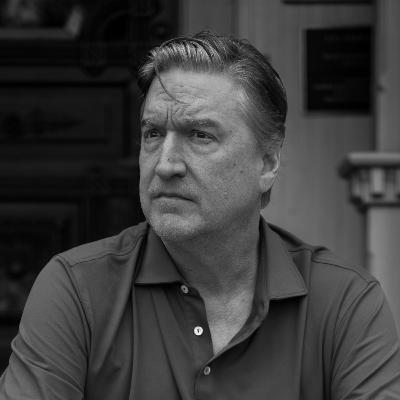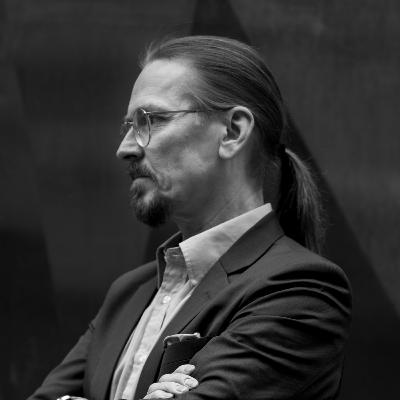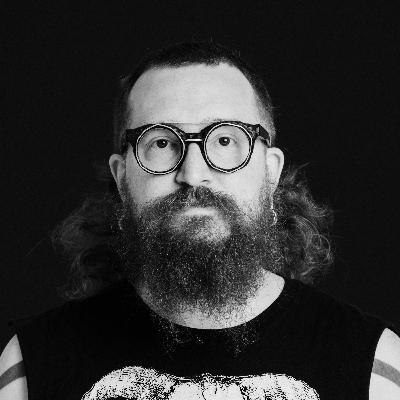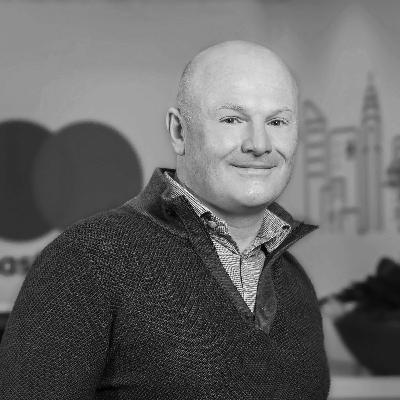Discover Between Worlds
Between Worlds

Between Worlds
Author: Mike Walsh
Subscribed: 4,352Played: 9,723Subscribe
Share
© All rights reserved
Description
Between Worlds is a technology podcast that takes you over the horizon and beyond borders, to bring you the global thinkers, innovators and troublemakers whose ideas challenge the world as we know it. From a courtyard cafe in Paris, to a busy sidewalk in Tokyo - each week futurist and global nomad, Mike Walsh, will share his personal conversations with some of the most fascinating people on the planet, recorded live in the field.
183 Episodes
Reverse
I sat down with Pierre-Yves Calloc'h, Chief Digital Officer at Pernod Ricard, to discuss the company's journey in embracing AI, algorithms and automation to drive marketing effectiveness, sales performance, and consumer engagement. Pernod Ricard, known for its extensive portfolio of brands such as Absolut Vodka, Jameson, and Ballantine's, has been at the forefront of leveraging AI to make data-driven decisions and personalize consumer experiences.
Byron Reese, an acclaimed author, futurist, and entrepreneur shares his insights on the concept of ‘Agora’, a superorganism formed by the collective interactions of human beings. Drawing parallels complex adaptive systems like beehives, Reese argues that just as individual bees come together to create an entirely new organism with emergent properties, humans too form a higher-order entity through their differentiated roles and interactions.
What are the new challenges that generative AI is creating for copyright law? In this episode, I speak with Matt Hervey, the head of AI law at Gowling, to explore the legal intricacies surrounding the creation of content and ideas by large language models. In our discussion, Matt sheds light on the complex landscape of AI ownership, highlighting the differences in legal frameworks across various jurisdictions, such as the UK, EU, and US.
Mikko Hyppönen is a renowned Finnish cybersecurity expert and the Chief Research Officer at WithSecure. In our discussion, we delved into the rapidly evolving landscape of cybersecurity threats, particularly focusing on the impact of artificial intelligence and large language models
Dave Johnson is Chief Data and Artificial Intelligence Officer at Moderna, where he is responsible for all enterprise data capabilities from data engineering, data integration, data science, and software engineering. Johnson holds a PhD in Information Physics and has over 15 years of experience in software engineering and data science. He has spent more than a decade working exclusively in enterprise pharma and biotech companies.
- What if within the span of the next decade, we could live for an additional ten years or more? A hundred years ago, advances in infection control and public health led to a near doubling of the human life span. For us to achieve a similar feat today, we will need more than just scientific breakthroughs. Despite the rise of AI, powerful computation platforms and new discoveries in genomics, there is still a gap between everyday medical practice and technological innovation.
Brian Christian is one of my favorite writers on AI, with a unique perspective that is very much at the intersection of computer science and philosophy. He is the author of the acclaimed bestsellers ‘The Most Human Human’ and ‘Algorithms To Live By’, which have been translated into nineteen languages. A visiting scholar at the University of California, Berkeley, he lives in San Francisco. His latest book, and the subject of this interview, is ‘The Alignment Problem’.
A US election is far more than just a struggle for the most powerful job in the world, they also provide a glimpse into consumer attitudes and emerging technologies designed to influence opinion. It was during the 2012 US election, for instance, that social media, online data and e-commerce profiling was leveraged for the first time to create a hyper-targeted, digital political campaign, that ultimately swept the Democrats into power. My guest this week, Harper Reed, was intimately involved in that strategy, having served as CTO of the Obama 2012 campaign, where he was the first to bring the mentality and connective capabilities of the tech industry to the political stage.
Despite all the talk about fintech disruption - banking, finance, and payments remain highly regulated industries with well-established competitors who are not standing still - even in this moment of rapid change and digital reinvention. Mastercard is one such company. They created Mastercard Labs as a way of co-creating and innovating with their customers. The idea was to turn external signals into opportunities, and in' doing so, de-risk' them for their clients and for the rest of the organization. So, for example, they are working on quantum computing with IBM. They have established their own proprietary blockchain and several AI projects and were behind the Apple Card's tokenization, which allowed it to work without the standard 16 digits.
To learn more about how Mastercard manages their innovation portfolio, I spoke with Ken Moore, who is the Chief Innovation Officer at Mastercard and also Head of Mastercard Labs. Ken is responsible for the company's R&D initiatives globally. Prior to joining Mastercard, he was a Director at Citibank, where he established Citi's first Innovation Lab and subsequently expanded it globally to create a network of collaborative innovation centers across the company.
This new age of smart machines will still need humans - but arguably, they will need to be ones who can think, create and make decisions in very different ways than the workforce of today. As with the first Industrial Revolution, reinventing education will be a priority going forward, especially if we are to survive the automation-led shakeup to jobs. To find out what it might take to transform schools and learning, I spoke with Dr. Shawn K. Smith , an education futurist and chief executive officer of Modern Teacher. Shawn also sits on the board of The Futures Institute, an organization dedicated to providing global insights on complex local problems.
Professor Tim Tangherlini calls himself a computational folklorist. Like many fields of research lately, folklore is a field where both the tools and objects of study are being profoundly reimagined by AI. I came across Professor Tangherlini's work after reading a research paper that he and his team published on using AI to study the structure and dissemination of conspiracy theories. Their research points the way to strategies that might defeat fake news by explaining how the elements of a conspiracy narrative come together and how they can also quickly fragment if some key parts are removed or challenged.
We talk about disruption all the time, but are we really ready to make the profound changes that come with true transformation? Many companies set disruption as their goal, and even believe that by shaking up their market, they will achieve high levels of growth. For Charlene Li, leaders have all it all backwards. Disruption doesn't create growth; instead, growth creates disruption.
Rodrigo Mendoza is co-founder and CEO of Quine, a company building hyper-fluid interfaces between software developers and the labour markets. Previous to Quine, Rodrigo was an academic, a venture capital professional, and a freelance data-scientist. Rodrigo holds a PhD in Mathematics from the University of Oxford, where he was also a postdoctoral researcher in Machine Learning.
Nick Walton is CTO and Co-Founder at Latitude, and creator of AI Dungeon. He has been working on deep learning technology for the last several years, working at autonomous vehicle companies and in a deep learning research lab at Brigham Young University. What makes AI Dungeon so interesting and relevant to the near future, is that it demonstrates the radical creativity that is possible when you combine a good idea with the heavy lifting of a Cloud AI system that can be generally applied to multiple use cases.
Workplace transformation has never been more important than now, in this time of crisis. So what does it take to build and sustain a culture that is not only innovative and creative, but capable handling constant reinvention? Is the fact that it is difficult and uncomfortable, the very reason we should do it anyway? Dr Adam Fraser is a human performance researcher and consultant who studies how organizations adopt a high performance culture to thrive in this challenging and evolving business landscape. He is the author of Strive: Embracing the gift of struggle and The Third Space: Using Life's Little Transitions to find Balance and Happiness.
Austin Grossman is one of my favorite authors. His books (including my personal recommendation, ‘Crooked’) typically reveal an alternate version of the reality you thought you were living in. Given that, his side gig as a design consultant to the video games and mixed reality industry makes total sense. Most recently, he also served as Director of Interactive Design at Magic Leap. We spoke about the emergence of XR (or extended reality), and the challenges of creating content and telling stories in multiple dimensions. According to Grossman, at Magic Leap, they often spoke of preparing for a future world ‘without screens’. So, just how far are we from that world of augmented experiences, and what will it mean for brands and storytellers when we get there?
While for many of us ‘working from home’ has been a new and unexpected challenge, for some companies, remote is how they were designed from the beginning. Zapier, a leading software automation platform, is one such of these. However, what makes Zapier a fascinating case study is not just their lack of physical offices, but the systems, workflows and practices that they have evolved to make their distributed organization function effectively. In this interview, I chat with Zapier’s CEO and co-founder, Wade Foster. Prior to Zapier, Wade worked as a customer development lead for The Idea Works, Inc. in Missouri. He is an alumni of Y Combinator and has degrees in industrial engineering and business administration from the University of Missouri-Columbia.
Our experience of reality is about to change. XR, which incorporates augmented and virtual reality, has shifted from a niche technology to consumer prime time. Now the question is how do we start to design compelling experiences, commercial partnerships and digital ecosystems to unlock the potential of this new medium. XR will change everything from the way we build digital retail stores to how a meeting planner might envision the space for a live event. My guest, Raffaella Camera, is working closely with a number of global brands and organizations to bring some of these ideas to life. A trained concert pianist and award-winning content creator, Raffaella Camera is the Global Head of Innovation & Strategy at the Accenture Extended Reality (XR) practice.
Mars, Incorporated was already well advanced in their plans for digital transformation before the crisis hit. However, when I spoke to Sandeep Dadlani, the company’s Chief Digital Officer, he explained that the pandemic led Mars to embrace a new internal clock speed. Sandeep Dadlani joined Mars, Incorporated as Global Chief Digital Officer in September 2017, and has responsibility for working with Mars' global business segments to drive its digital transformation agenda, while delivering effectiveness and efficiency to existing business and technology platforms. In the last two years, he has driven a new wave of consumer and user centricity, unleashed the power of data, analytics, AI, and automation while driving new agile digital behaviors across the enterprise.
Now that the pandemic has plunged us into the world's largest remote work experiment, what are we learning about the kind of culture that supports distributed organizations? And how do leaders build a cultural operating system for a time of crisis and change? To answer this question, and to also understand how data is changing our understanding of performance and transformation - I spoke with Didier Elzinga, the CEO and co-founder of Culture Amp – one of the world’s fastest growing technology startups and has helped companies around the world harness the power of employee feedback to drive positive change. If you enjoyed this episode and Didier's perspectives, please take a moment to read my article on this topic in the Harvard Business Review.

























Wonderful conversation! In-depth. A wide range of ethics issues covered in the new digital economy and digitalised life we lead as netizens.